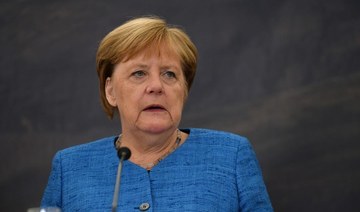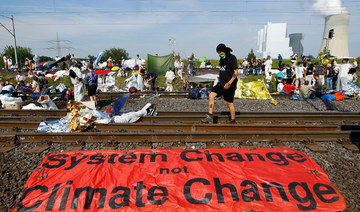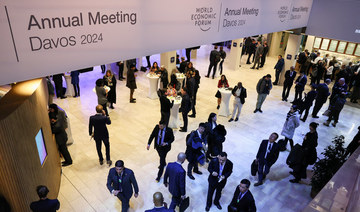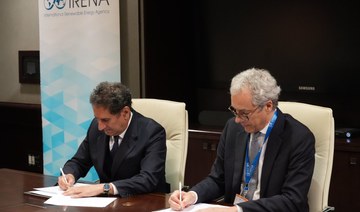FRANKFURT, Germany: A recession looms for Germany and the European Central Bank is pleading for governments to spend more to revitalize economic growth. Yet despite having the luxury of borrowing money for less than nothing, the German government is keeping a tight rein on its finances.
A debate over Germany’s devotion to budget austerity is intensifying as the outlook for the economy dims and public pressure grows to address big issues such as global warming. On Friday, the government will unveil a raft of measures that could include billions in incentives and spending to make the economy more environmentally-friendly.
“The call for fiscal stimulus has never been louder,” said Carsten Brzeski, chief economist for the bank ING Germany. “And this week will show whether the eurozone country with the deepest pockets finally plans to empty them.”
The slowdown in growth across Europe, blamed largely on the US-China trade conflict and uncertainty about Brexit, is putting a sharp focus on Germany’s devotion to the so-called “Schwarze Null,” or “black zero,” which refers to the policy of balancing the budget — the zero — with at least a small surplus to keep it in the black.
The debate over government spending policy affects the entire 19-country eurozone, since more government outlays by Germany and other fiscally sound countries such as the Netherlands could help support growth by building new infrastructure, such as roads, rail lines or high-speed Internet, or by gathering less in taxes.
The German government has so far shown little willingness to change its stance. It has ignored repeated pleas from the head of the European Central Bank, Mario Draghi, who said last week it was “high time” for government spending to take over as the main tool of economic policy. The central bank announced interest rate cuts and bond purchases in an attempt to ward off a downturn.
The government argues it’s important to reduce debt while the economy is growing and not to burden future generations. German Finance Minister Olaf Scholz submitted a balanced draft budget of 360 billion euros ($400 billion) for 2020 last week and Chancellor Angela Merkel said in a speech before the German Taxpayers’ Federation that the government was sticking to its balanced budget, “not as a goal in itself, as we are often accused of doing, but because clear economic reasons and fairness aspects argue for that.”
Merkel noted that Germany’s total debt would fall below 60% of gross domestic product — the limit for countries that use the euro — for the first time since 2002. The German constitution itself sharply limits deficits to 0.35% of GDP except in a crisis, yet the government’s surpluses go well beyond that requirement.
While the German government may not be giving up on balanced budgets, there are signs it is at least easing up the zeal with which it amasses surpluses.
Last year’s surplus of 1.9% of GDP has fallen to 1.4% this year and is expected to hit 0.9% next year — meaning that the government is already providing some fiscal stimulus. Germany’s economy shrank 0.1% in the second quarter and underlying figures are pointing to another quarter of contraction, which would put the country in a technical recession.
It is striking that the government refuses any new borrowing at a time when it can do so at negative interest rates — meaning it would get paid back more than it borrows. German 10-year bonds currently yield minus 0.48%, and the government was able to sell a 30-year bond at a negative interest rate in August.
Marcel Fratscher, the head of the German Institute for Economic Research in Berlin, has called the balanced budget a “false fetish.” His institute has argued that Germany needs to invest in long-term modernization projects such as extending digital services in rural areas.
The president of the Federation of German Industries, Dieter Kempf, said in an interview with Der Spiegel that “it’s worth considering sensible use of the space,” allowed by the constitution to fund more investment.
The calls to spend are not coming only from those concerned about the economy, but also climate activists who say more needs to be done to shift the world economy from carbon-intensive industries and consumption. Public pressure has only grown after the country witnessed its hottest summer on record and the opposition Greens party made big gains in elections to the European Parliament and in domestic polls.
On Friday, the government is expected to unveil a package of incentives aimed at reducing carbon dioxide emissions from homes and autos so that Germany can meet its goals under the 2015 Paris climate accord. Possible measures include incentives to replace old heating systems or to purchase battery-powered autos. A report in Die Welt newspaper said the government was considering measures totaling some 40 billion euros ($44 billion) through 2023.
Brzeski said such a program “would not be enough to stop the slide of the economy toward recessionary territory, but it could be an important cornerstone in Germany’s recovery and its quest for a new economic model.”
Spending on that level would only be “a slow-motion stimulus” since it will take time to roll out, said Holger Schmieding, chief economist at Berenberg bank.
“It will add up over time and support domestic demand,” he said. “However, the German stimulus will not be a European, let alone a global, game changer.”
Can green investment help relaunch Germany’s economy?
Can green investment help relaunch Germany’s economy?
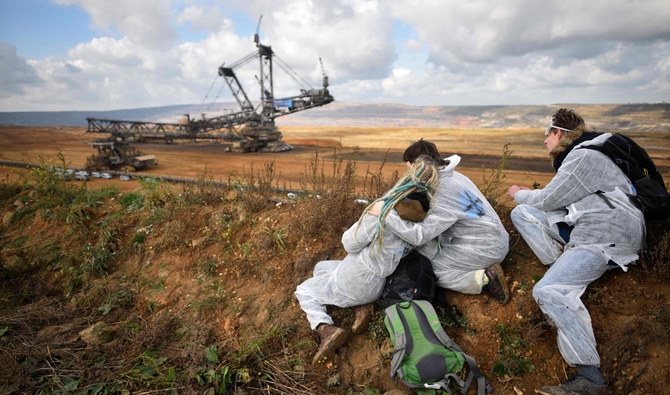
- The German government has so far shown little willingness to change its stance
Pakistan hopes to get new IMF loan by early July, says finance minister
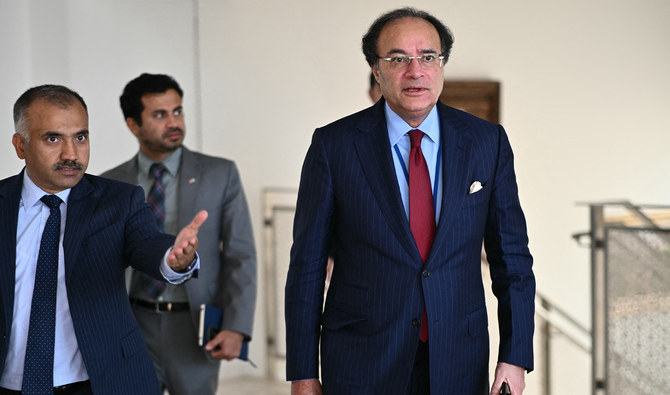
- Pakistan’s current $3 billion financial arrangement with IMF expires in late April
- Islamabad is seeking “bigger,” long-term loan to ensure macroeconomic stability
Pakistan is hoping to reach a staff-level agreement with the International Monetary Fund by June or early July, its finance minister said on Tuesday.
The country’s current $3 billion arrangement with the fund runs out in late-April, which it secured last summer to avert a sovereign default.
Islamabad is seeking a long-term bigger loan to help bring permanence to macroeconomic stability as well as an umbrella under which the country can execute structural reforms.
“We are still hoping that we get a staff-level agreement by June or early July,” Finance Minister Muhammad Aurangzeb told a conference in Islamabad.
He returned from Washington last week after leading a team to attend the IMF and World Bank’s spring meetings. “We had very good discussions in Washington,” he said.
He said he did not know at this stage the volume and tenure of the longer program.
Riyadh prepares to host special meeting of World Economic Forum

- The aim of the gathering is to find solutions to global challenges relating to humanitarian issues, the climate and the economy
RIYADH: Final preparations are taking place this week in the Saudi capital, Riyadh, for a special meeting of the World Economic Forum in the city on April 28 and 29.
Heads of state and senior executives from the public and private sectors are expected to be among the participants, who will discuss a range of global economic issues and developments under the theme “Global Collaboration, Growth and Energy for Development.”
The aim of the meeting is to find solutions to a host of global challenges relating to humanitarian issues, the climate and the economy. On the sidelines of the main event, the Kingdom will host exhibitions and other events to highlight the latest developments and trends in areas such as sustainability, innovation and culture.
The selection of Riyadh as host of the special meeting reflects the extensive partnership between Saudi Arabia and the WEF, officials said.
It builds upon the Kingdom’s active participation and contributions to the WEF’s Annual Meetings in Davos.
The agenda is designed to rekindle the spirit of cooperation and collaboration with various panel discussions, workshops, and networking opportunities. It represents a significant gathering of global leaders and experts dedicated to forging a path toward a more resilient, sustainable, and equitable world.
ACWA Power inks deal to drive renewable energy development in Azerbaijan
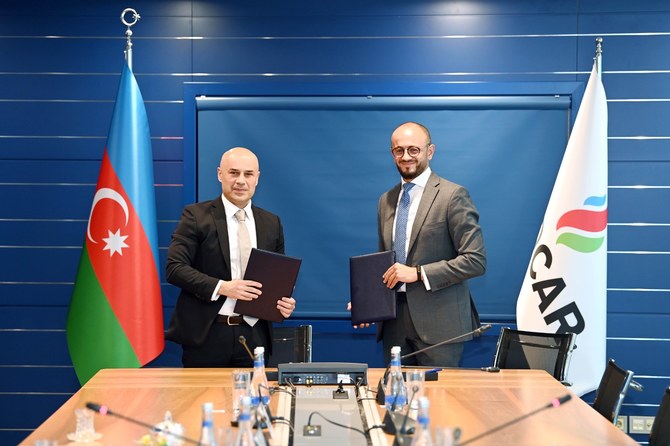
RIYADH: Saudi energy giant ACWA Power is signing a new agreement to accelerate the development of renewable projects in Azerbaijan.
The private water desalination company, known for its extensive green hydrogen storage capacity, announced it has now finalized an agreement with SOCAR, the State Oil Company of the Azerbaijan Republic.
This development follows an initial cooperation understanding signed in February 2023.
This deal focuses on the joint evaluation of the “Low-Carbon/Green Fertilizer” project, in which the two bodies will collaborate on assessing the production of green hydrogen to support the decarbonization of SOCAR downstream assets.
Marco Arcelli, CEO of ACWA Power, said in a statement, “I am proud to announce our collaboration with SOCAR to ignite a new era of renewable energy development in Azerbaijan. With our shared vision and commitment to sustainability, this partnership will not only drive innovation but also pave the way for a cleaner and brighter future for this country.”
The primary directive of the agreement will be to enhance SOCAR’s carbamide fertilizer facility, striving toward more value-added low-carbon products.
As part of the project, SOCAR and ACWA Power will conduct feasibility studies to assess the potential production and sale of green fertilizers, aligning with Azerbaijan’s vision of achieving a clean environment.
ACWA Power will take a role in driving the project’s renewable energy and green hydrogen production aspects, bringing their expertise to bear on this initiative.
For his part, Anar Mammadov, vice president of SOCAR, said, “Azerbaijan is committed to building a sustainable future, and our partnership with ACWA Power underscores our shared dedication to driving renewable energy development in the region. Together, we will work towards realizing our vision of a cleaner, greener Azerbaijan.”
He added: “The cooperation with ACWA Power represents a significant step forward in Azerbaijan’s transition towards a low-carbon economy and underscores the commitment of both organizations to sustainable development practices.”
Preceding this announcement, the two nations posed their intent to collaborate on renewables as Saudi Arabia’s Minister of Energy Prince Abdulaziz bin Salman met with Azerbaijan’s Minister of Environment and Natural Resources Mukhtar Babayev in March.
During the meeting, the counterparts discussed opportunities for work and cooperation between their two countries in the field of climate change.
They also talked about joint efforts to achieve the goals of the UN Framework Convention on Climate Change and the Paris Agreement, the Kingdom’s ministry said in a statement at the time.
Closing Bell: TASI edges down to close at 12,509 points
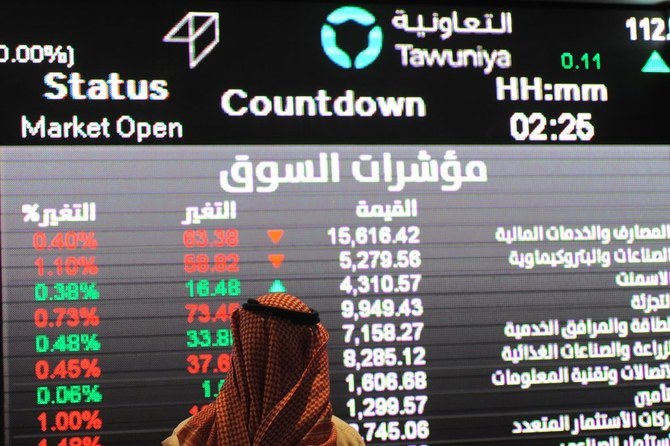
RIYADH: Saudi Arabia’s Tadawul All Share Index closed at 12,508.93 points on Monday, losing 9.29 points or 0.07 percent.
The parallel market, Nomu, also shed 343.96 points or 1.28 percent to end the day’s trading at 26,596.22.
Concurrently, the MSCI Tadawul 30 Index fell 3.95 points or 0.25 percent to finish at 1,567.16.
The main index posted a trading value of SR8.8 billion ($2.3 billion), with 74 stocks advancing and 148 declining. On the other hand, Nomu reported a trade volume of SR37.7 million.
Al-Rajhi Company for Cooperative Insurance was the top performer on TASI as its share price surged 9.93 percent to SR126.20. LIVA Insurance Co. followed next with its share price jumping 9.92 percent to close at SR21.50.
Gulf General Cooperative Insurance Co. also performed well, climbing 9.16 percent to SR16.44. Raydan Food Co. and Fitaihi Holding Group increased 8.14 and 8.11 percent to SR28.55 and SR4.40, respectively.
Conversely, Saudi Cable Co. recorded the most significant dip, declining 4.94 percent to SR75.
Alkhaleej Training and Education Co. and Ash-Sharqiyah Development Co. also experienced setbacks, with their shares dropping to SR31.50 and SR23.40, reflecting declines of 4.83 and 4.10 percent, respectively.
Nomu’s top performer was Dar Almarkabah for Renting Cars Co., which saw a 9.73 percent jump to SR44. Mayar Holding Co. and Alqemam for Computer Systems Co. also recorded notable gains, with their shares closing at SR4.27 and SR89.80, marking an increase of 7.02 and 5.03 percent, respectively. Arabian International Healthcare Holding Co. and Foods Gate Trading Co. also fared well.
On Nomu, Raoom Trading Co. was the worst performer, declining by 7.28 percent to SR135. Other underperformers included Natural Gas Distribution Co. and National Environmental Recycling Co., whose share prices dropped 5.58 percent and 5.23 percent to SR42.30 and SR12.32, respectively.
Watani Iron Steel Co. and Future Care Trading Co. declined during the day to settle at SR2.81 and SR8.70, respectively.
Saudi Aramco in talks to acquire 10% stake in China’s Hengli Petrochemical
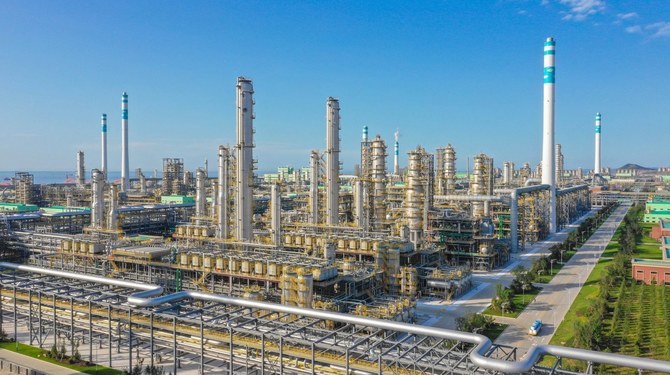
RIYADH: Energy giant Saudi Aramco held talks with Chinese Hengli Group Co. to acquire a 10 percent stake in its subsidiary, subject to due diligence and required regulatory clearances.
Aramco and Hengli Petrochemical Co. signed a memorandum of understanding for the proposed deal. The agreement supports the former’s strategy to increase its presence in key downstream markets, enhance its liquids-to-chemicals initiative, and ensure long-term crude oil supply agreements.
Last year, Aramco signed two multibillion-dollar agreements for liquids to chemicals investments in China.
In March 2023, a deal was signed between China’s Norinco Group and Panjin Xincheng Industrial Group to establish a joint venture to build a refinery and petrochemical complex in China’s Liaoning province. The initiative cost stands at approximately $12 billion.
The second agreement, signed in July, is an acquisition of a 10 percent stake in China-based firm Rongsheng Petrochemical Co. for $3.4 billion.
“This MoU supports our efforts to grow our global downstream footprint. We continue to explore new opportunities in important markets as we seek to progress in our liquids-to-chemicals strategy,” Mohammed Al-Qahtani, Aramco’s downstream president, said in a press release.
He continued: “We look forward to forging new partnerships and are excited by the prospect of expanding our presence in the important Chinese market.”
Hengli Petrochemical, a controlled subsidiary of Hengli Group, owns and operates a 400,000-barrel-per-day refinery and integrated chemicals complex in Liaoning province, and several plants and production facilities in Jiangsu and Guangdong provinces.
Speaking at a development forum held in March 2023 in Beijing, Amin Nasser, president and CEO of Aramco, highlighted substantial opportunities for cooperation between Saudi Aramco and Chinese partners in sectors aimed at reducing emissions.
“China has distinct strengths in renewables and critical materials, while Aramco and Saudi Arabia have a clear interest in solar, wind, hydrogen, and electrofuels. These areas have great long-term potential, and combining our strengths could match our ambitions,” he noted.
Saudi Arabia and China are working together to strengthen their already well-established strategic ties.
In September, the Kingdom’s minister of industry and mineral resources held meetings with key Chinese officials in Beijing. Bandar Alkhorayef also toured various companies and factories in different Chinese cities as part of his trip.
He held talks with China’s Vice Minister of Commerce Wang Shouwen, during which they discussed ways to boost economic collaboration and trade ties, the Saudi Press Agency reported.
The top officials also discussed investment opportunities in several economic sectors, including mining. At the time, the Saudi minister highlighted the Kingdom’s progress in the field of industries and mining.



